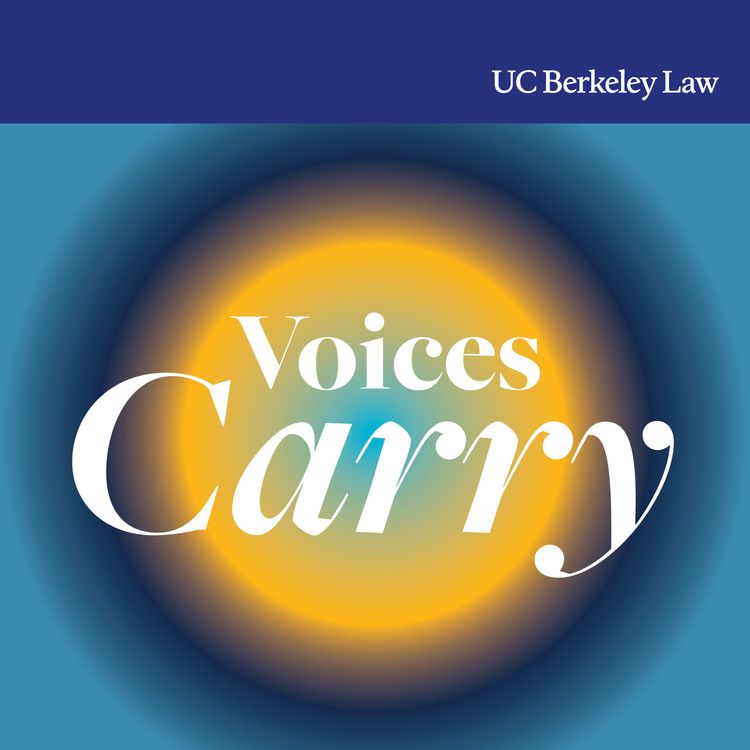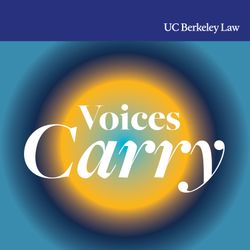Share

Berkeley Law Voices Carry
Professor Colleen Chien on Patents, Equity, and Racial Justice
In this episode, host Gwyneth Shaw talks with Professor Colleen Chien ’02, a cross-disciplinary scholar whose research spans innovation, intellectual property, and the criminal justice system. She’s just joined the Berkeley Law faculty — the ninth hire for the school this year.
Chien is a Berkeley Law alumna and studies a wide range of topics, including innovation, intellectual property, and the criminal justice system. A faculty co-director of our Berkeley Center for Law & Technology, she also founded and directs two grant-funded research initiatives: the Innovator Diversity Pilots Initiative, which develops rigorous evidence to boost inclusion in innovation, and the Paper Prisons Initiative, which conducts research to address and advance economic and racial justice.
She was a member of the Biden-Harris transition team and has worked as a senior advisor on IP issues in the Obama White House, the U.S. Department of Commerce, and the U.S. Patent and Trademark Office, where she currently serves as a Marion Croak Distinguished Scholar.
Click here to read more about Professor Chien and her work. Here are a few of her many publications if you’d like to dive even deeper:
- Improving Equity in Patent Inventorship
- America's Paper Prisons: The Second Chance Gap
- The Inequalities of Innovation
- Rigorous Policy Pilots: Experimentation in the Administration of Patent Law
About:
“Berkeley Law Voices Carry” is a podcast hosted by Gwyneth Shaw in the Berkeley Law Communications Office about how the school’s faculty, students, and staff are making an impact — in California, across the country, and around the world — through pathbreaking scholarship, hands-on legal training, and advocacy.
Production by Yellow Armadillo Studios.
More episodes
View all episodes

19. Professor Brian Galle on ‘How to Tax the Ultrarich’
40:59||Season 1, Ep. 19In this episode, host Gwyneth Shaw talks with Professor Brian Galle, who’s just released a new book, How to Tax the Ultrarich, outlining a plan for fairer taxation at the federal level.For the full transcript, show notes, and links, please visit this episode page on the Berkeley Law Podcast Hub.
18. California Constitution Center Executive Director David A. Carrillo
29:02||Season 1, Ep. 18In this episode, host Gwyneth Shaw talks with David A. Carrillo, a Berkeley Law Lecturer in Residence and the executive director of the California Constitution Center, a nonpartisan academic research center devoted to studying the state’s constitution and Supreme Court. For the full transcript, show notes, and links, please visit this episode page on the Berkeley Law Podcast Hub.
17. Catherine E. Lhamon on Protecting Democracy
28:13||Season 1, Ep. 17In this episode, host Gwyneth Shaw talks with Catherine E. Lhamon, the inaugural executive director of UC Berkeley Law’s Edley Center on Law & DemocracyFor the full transcript, show notes, and links, please visit this episode page on the UC Berkeley Law Podcast Hub.
16. Center on Reproductive Rights and Justice Executive Director Arneta Rogers on the Post-Dobbs Lanscape
41:07||Season 1, Ep. 16In this episode, host Gwyneth Shaw talks with Arneta Rogers, executive director of UC Berkeley Law’s Center on Reproductive Rights and Justice. For the full transcript, show notes, and links, please visit this episode page on the UC Berkeley Law Podcast Hub.
15. Professor David Hausman’s Deportation Data Project
28:15||Season 1, Ep. 15In this episode, host Gwyneth Shaw talks with UC Berkeley Law Professor David Hausman, faculty director of the Deportation Data Project, the first centralized repository of individual-level U.S. government immigration enforcement data. This spring, the project obtained and made available online an individual-level dataset including anonymized identifiers that correspond to individuals, allowing users to follow individuals through the enforcement process without learning their identities.For the full transcript, show notes, and links, please visit this episode page on the Berkeley Law Podcast Hub.
14. Professor Chris Jay Hoofnagle Talks Cybersecurity
29:42||Season 1, Ep. 14Host Gwyneth Shaw talks with UC Berkeley Law Professor Chris Jay Hoofnagle, whose latest book, Cybersecurity in Context: Technology, Policy, and Law, was published last fall. Hoofnagle and his co-author, LSU computer science and engineering Professor Golden G. Richard, wrote the book to accompany courses on this important topic, but also worked to make it accessible to students and teachers in any discipline. The textbook includes a set of hands-on exercises on self-contained virtual machines for Linux, Windows, and Mac so readers can experience how cybersecurity works in practice. For the full transcript, show notes, and links, please visit this episode page on the Berkeley Law Podcast Hub.
13. Professors Daniel Farber and Jonathan Gould on Democracy, the Constitution, and Congress
46:10||Season 1, Ep. 13Host Gwyneth Shaw talks with UC Berkeley Law Professors UC Berkeley Law Professors Daniel Farber and Jonathan Gould — experts on presidential power, constitutional law, and the U.S. Congress and the faculty directors of the law school’s Christopher Edley Jr. Center on Law & Democracy. Founded last fall after the death of the law school’s beloved former dean and national political and policy influence for decades, the center aims to defend and strengthen democratic institutions in the United States through actionable research and public leadership.Just a few weeks into the second administration of President Donald Trump, the center is convening expert panels to explore the implications of the president’s first moves — many of which are setting off alarm bells about the rule of law, the separation of powers, and even the strength of the U.S. Constitution itself. The center’s events archive has videos of these discussions. For the full transcript, show notes, and links, please visit this episode page on the Berkeley Law Podcast Hub.
12. "Emergency Powers for Good" with Professors Katerina Linos & Elena Chachko
40:49||Ep. 12In this episode, host Gwyneth Shaw talks with UC Berkeley Law Professors Katerina Linos and Elena Chachko about their new paper in the William & Mary Law Review, “Emergency Powers for Good.” In the article and a blog post on “Lawfare,” they discuss how emergency powers — often associated with overreach and authoritarianism — can be used in legitimate and transformative ways. The piece has drawn a strong reaction, including a comment in the Yale Journal on Regulation (and a response from the authors). “Berkeley Law Voices Carry” is a podcast hosted by Gwyneth Shaw about how the school’s faculty, students, and staff are making an impact — in California, across the country, and around the world — through pathbreaking scholarship, hands-on legal training, and advocacy. For the full transcript and show notes please visit the episode page. Production by Yellow Armadillo Studios.
11. Climate and Energy Policy After Chevron
57:48||Season 1, Ep. 11This special episode features two Berkley Law experts discussing the fallout from the U.S. Supreme Court’s Loper Bright Enterprises v. Raimondo decision, which overruled the longstanding doctrine of the Chevron v. Natural Resources Defense Council case, which was decided in 1984. The decision sent shock waves through the field of administrative law and is expected to have a particularly large impact on climate and energy policy. In this episode, Center for Law, Energy & the Environment Executive Director Louise Bedsworth leads a conversation with Berkeley Law Professors Daniel A. Farber and Sharon Jacobs about the decision, its reasoning, and what might happen looking forward. Farber is the center’s faculty director and a leading scholar in Constitutional, administrative, and environmental law. His most recent book is Contested Ground: How to Understand the Limits on Presidential Power and he’s been on the Berkeley Law faculty since 2002. Jacobs, who joined the faculty in 2022, teaches and writes in the areas of energy law, environmental law, and administrative law. Visit CLEE’s website for more information, learn more about upcoming events, and to join their mailing list. About:“Berkeley Law Voices Carry” is a podcast hosted by Gwyneth Shaw about how the school’s faculty, students, and staff are making an impact — in California, across the country, and around the world — through pathbreaking scholarship, hands-on legal training, and advocacy. Production by Yellow Armadillo Studios. For a transcript, please visit the episode page.